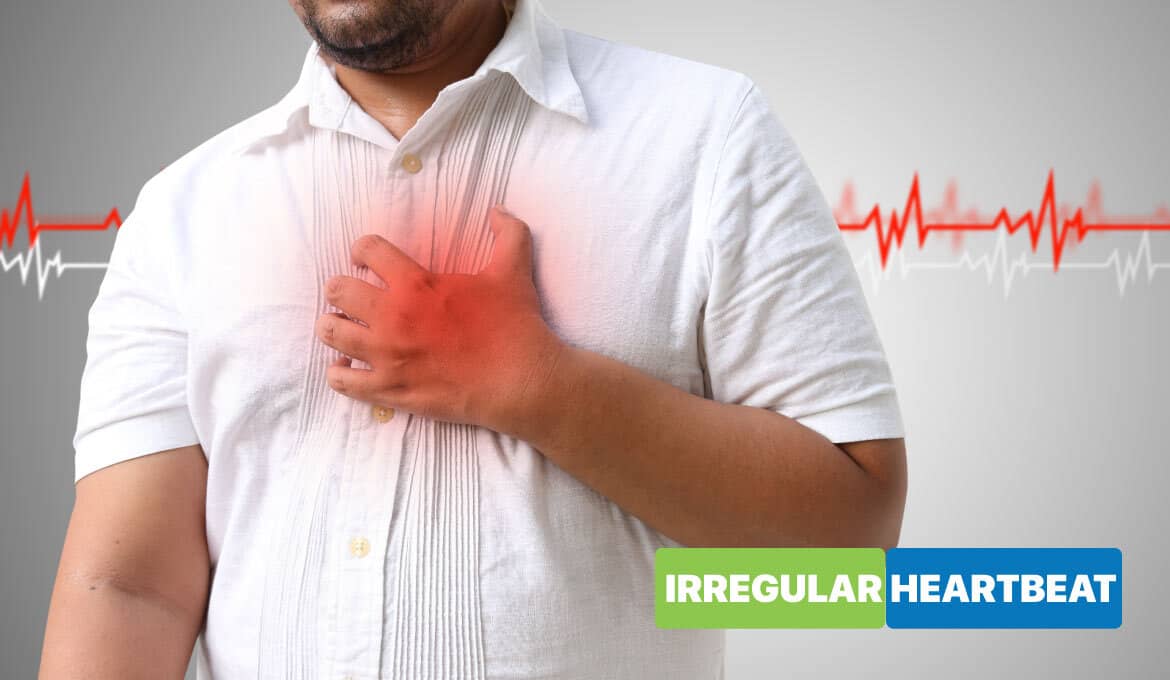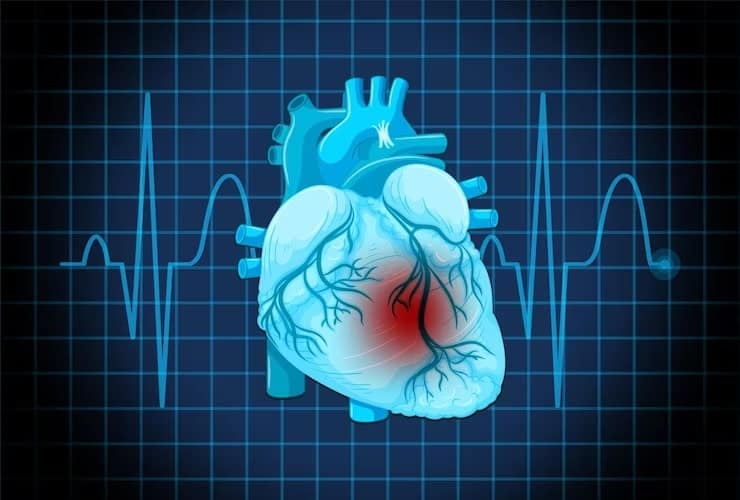
“Do your part, care for your heart”…. A healthy heart is a way to a healthy life. Ensure you're taking good care of your heart to lead a healthier and happier life.
You should be worried about an irregular heartbeat when you feel that your heart is beating too fast, or slow, or irregularly. It’s normal to feel a fast or slow heartbeat for a person due to intense activity or exercise.
However, regular checkups and immediate medical intervention can save you from major heart problems that can be life-threatening. One of the common heart problems is heart arrhythmia.
Heart arrhythmia is an irregular heartbeat that causes your heart to beat too fast, or slow, or irregularly. Therefore, keeping track of your eating habits and lifestyle can reduce the risk of facing any heart-related problems.
What is heart arrhythmia?
A heart arrhythmia is an abnormal heartbeat. This happens when the electrical signals responsible for heart rhythm don't function optimally.
Distorted signaling can cause the heart to beat too fast or slow. A normal heartbeat should be between 60 to 100 beats per minute. If the heartbeat exceeds more than 100 beats per minute it may lead to heart problems.
Heart arrhythmia may feel like a fluttering or pounding heart. It is common and can be harmless, but in certain situations, it can be termed problematic or even life-threatening.
However, it is normal for a person to have a fast or slow heartbeat, if a person is involved in a physical activity or exercise which causes variation in their heartbeat.
It is advised to seek medical help when you feel uneasy or observe an irregular heartbeat.
Types of Arrhythmia
Arrhythmia leads to a group of conditions that affects the heart’s regular rhythm. Varied arrhythmia causes the heart to beat too fast, slow, or irregularly.
Arrhythmia can occur in the atria (upper chamber of the heart) and ventricles (lower chamber of the heart). The types of arrhythmia are classified based on the heart rate, origin, and frequency. This includes:
• Bradycardia
Occurs when the heart beats slowly (under 60 beats per minute) due to heart block and sick sinus syndrome.
• Tachycardia
Occurs when the heart rate is too fast (more than 100 beats per minute), thus, affecting the way the heart pumps blood.
Due to this, the ventricles fail to fill the necessary amount of blood to pump to the rest of the body.
It is not serious if it only lasts for a few minutes. However, seek medical support if it lasts for more than 30 minutes.
• Ventricular arrhythmia
Occurs in the ventricles (lower chamber of the heart). This prevents the oxygen-rich blood from circulating to the brain and body and might lead to cardiac arrest.
Further, the Ventricular arrhythmia is classified into four types, they are as follows:
i). Ventricular Tachycardia
It is generally seen in people who have had heart disease or other heart-related problems like coronary artery disease or prior heart attack.
This can cause a heart rate of 100 beats per minute or higher, with the rhythm occurring in the lower chamber of the heart.
Therefore, it can be problematic if it lasts longer than a few minutes as it can lead to other severe ventricular arrhythmias like ventricular fibrillation.
ii). Ventricular fibrillation
Ventricular Fibrillation (VF) is when a person experiences sudden rapid, irregular, or abnormal heartbeats in the ventricle.
These inconsistent electrical impulses are sometimes caused by heart attacks due to vibration in the ventricle.
This type of arrhythmia cannot pump blood in the body, causing the heart rate to drop quickly, leading to sudden cardiac arrest or death, unless treated immediately.
iii). Supraventricular arrhythmia
Supraventricular arrhythmia or atrial arrhythmia occurs in the upper chamber of the heart above the ventricles.
This occurs when the electrical system that controls the heart rhythm doesn't function optimally, causing a sudden increase in the heartbeat that drops abruptly.
An average heartbeat is between 60 to 100 beats per minute. But, with Supraventricular arrhythmia, the heartbeat can increase to over 100 bpm. This can happen if a person is exercising or resting.
iv). Premature heartbeat
A premature heartbeat is when a person experiences an extra heartbeat in the lower ventricle of the heart.
Symptoms of Arrhythmia
Arrhythmia usually doesn't show any symptoms. However, common symptoms include:
- A faster heartbeat: It is usually caused due to exercise or stress response.
- Slow heartbeat: A slower heart rate, usually less than 60 beats per minute. This may happen due to an underlying health issue.
- Chest pain: This is when you feel stabbing pain, a dull ache, or even heartburn. This may be the symptom of an underlying heart condition. It can also occur due to many less serious reasons.
- Shortness of breath: It is intense tightening in the chest, air hunger where you may feel difficulty while breathing, breathlessness, or suffocation.
This can occur due to intense exercise, extreme temperature, or obesity. Besides these examples, it can be an underlying health problem.
Other symptoms might include:
- Fatigue
- Sweating
- Dizziness
- Anxiety
- Fainting
- Low blood pressure
However, consult a doctor if you experience any of the symptoms to avoid any serious issues related to the heart.
Causes of arrhythmia
Arrhythmia can happen due to various factors, such as medical, emotional, physical, or genetic causes.
Antibiotics or other medications can also cause arrhythmia in some people. This might include medication used to treat:
- High blood pressure
- Cold
- Allergies
- Depression
Risk factors that lead to heart arrhythmia include:
- Age: Aging can lead to changes in the blood vessels that increase a person’s risk of contracting cardiovascular diseases.
- Genes: Some heart diseases may run in the family. A person can be vulnerable to heart disease if their family or close relatives have had heart arrhythmia.
- Medical conditions: Low blood sugar, sleep apnea, high blood pressure, diabetes, obesity, and autoimmune disorders are among the conditions that may lead to heart arrhythmia.
- Lifestyle: Consumption of alcohol, tobacco, and drugs also increase the risk of arrhythmia.
- Environment: Air pollution is strongly associated with cardiovascular diseases. According to the World Health Organization(WHO), one in five cardiovascular deaths is due to air pollution.
Diagnosis for Arrhythmia:
To detect any heart condition, doctors conduct various tests that include:
EKG or ECG: Electrocardiogram (EKG) is a test done using small electrode patches that are placed on a person's chest, arms, and legs. It is a painless test procedure to detect different heart conditions.
Ambulatory electrocardiogram: In this test, electrodes are connected to a small box attached to a belt. You should wear the belt for 24 hours while doing your day-to-day activities.
The ECG will monitor and record any abnormalities over a day. You are also instructed to record any symptoms according to that, and you will be assisted by the cardiologist or electrophysiologist.
Stress test: A stress test is conducted to assess the heart's ability to respond to external stress in a controlled clinical setup.
The stress test is prompted by exercise or intravenous pharmacological stimulation to increase the blood flow to get exercise stress test-like results.
MRI: Magnetic resonance imaging (MRI) is a type of scan done using strong magnetic fields and radio waves to produce a complete picture of the internal body.
It helps identify the problems with the structure of the heart and body supply.
Tilt test: A tilt test is conducted to observe any unexplained condition of lightheadedness, dizziness, or fainting. During the test, you will lie on the table that is slightly tilted upward.
This helps to determine whether the cause is related to heart rate or blood pressure.
Cardiac Computed Tomography (CT): This test combines a series of X-ray images taken from different angles of the body and uses a computerized process to create cross-sectional images.
This gives deeper information than plain X-rays.
Echodiagram: An echodiagram is an ultrasound scan of the heart that uses high-frequency sound waves to create an image of the heart.
This test is done to determine the size of the heart, valves function, and muscle contraction and relaxation.
How to prevent arrhythmia?
People can't always control arrhythmia. However, regular checkups and maintaining a healthy lifestyle can reduce the risk of heart arrhythmia.
Here are some steps to avoid arrhythmia:
- Eat healthy food that is rich in protein
- Add more green leafy vegetables and fruits to your diet
- Avoid saturated and trans fats
- Keep blood pressure and cholesterol under control
- Avoid smoking and drinking
- Exercise regularly
- Manage cognitive health
- Limit consuming caffeine
This blog article aims at providing information about heart arrhythmia. However, it is advisable to consult a doctor when you observe or experience any of the symptoms.
Take immediate treatment or medication to avoid the risk of arrhythmia and related problems.
FAQs
1. Does arrhythmia always need treatment?
Ans: Some heart arrhythmia doesn't require treatment. However, your doctors will advise you to have regular checkups to monitor your heart condition. Arrhythmia treatment is needed when there is an irregular heartbeat causing severe symptoms.
2. How long can heart arrhythmia last?
Ans: Heart arrhythmia is caused by abnormal electrical patterns in the heart. This could last for a few minutes, hours, days, or even years.
3. What happens if you don't treat heart arrhythmia?
Ans: Generally, heart arrhythmia causes heart failure, stroke, and sudden death. It is associated with an increased risk of blood clots. If not treated on time, it transfers from the heart to the brain leading to stroke if the clot breaks loose.
4. Is arrhythmia permanent?
Ans: Arrhythmia can be preventable with early treatment and medications. If not treated on time, arrhythmia can cause serious damage to the heart, brain, and other organs of the body. It doesn't answer whether it is a permanent chronic condition that requires regular treatment, or something that can be cured once and for all.
5. How common is arrhythmia?
Ans: Arrhythmia is common and harmless, in certain cases, it can cause serious issues. It feels as if your heart is fluttering or pumping too fast or sometimes too slow, and this is due to irregular heart rhythm. Therefore, it is recommended to consult your doctor if you experience any discomfort or pain.
6. Can ECG detect arrhythmia?
Ans: Electrocardiogram (ECG) is a test done using small electrode patches that are placed on a person's chest, arms, and legs. It is a painless test procedure to detect different heart conditions including arrhythmia.
Read Also:


